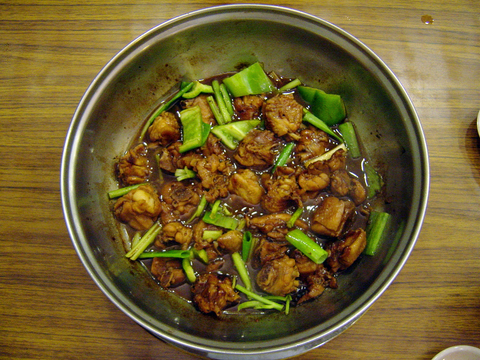It is not hard to see why there is always a long queue outside a two-floor restaurant called I Pin Hua Tiao Chicken on Civil Boulevard across from the Breeze Center (微風廣場). The food is innovatively prepared and delicious, and the great service makes the dining experience relaxing and fun. And all these good things come at a price that will not break the bank.
The food at the joint is a creative mixture of hot pot and home-cooked meals. Featuring only four main courses on the menu, the restaurant is known for its strong-flavored, tasty chicken dishes. The recommended specialty is hua tiao chicken. For this dish, the chicken is first sautéed with 15 different seasonings and simmered with hua tiao wine (花雕酒), which is a high-grade shaoxing-style wine (紹興酒).
Pork rib pot (NT$880) is an alternative choice that comes in a huge portion that is enough for six people. It is grilled then stewed for 12 hours until all the flavor is released into the sauce.

PHOTO: HO YI, TAIPEI TIMES
After sampling the tender meaty delicacy, you can pick up your favorites from a wide range of hot pot items such as pig-blood sticky rice cake, fish and shrimp dumplings and various kinds of vegetables and mushrooms and stew the food in the rich-flavored sauce. For those who prefer a bit of luxury, crabs and lobster balls are the best choices.
Unlike in a hot pot restaurant where customers cook their own food, the well-trained, good-humored young wait staff frequently come to the table, adding broth as the soup thickens.
And if time permits, the wait staff will surprise customers with a bonus show of magic tricks. "We all know a few tricks and like to offer some entertainment to customers when we are not busy," one of wait staff and magician-to-be told the reporter.
Apart from the hot pot sets, a few exotic dishes can also be found on the menu including ostrich meat in oyster sauce (NT$250) and betel nut flowers (NT$168). A more lightly flavored clam pot is a popular appetizer using rice wine and ginger to bring out the fresh flavor of the clams.
Since it was established five years ago, the restaurant's reputation has kept on growing, and reservations are essential if you hope to get a table, even on weekdays.

June 2 to June 8 Taiwan’s woodcutters believe that if they see even one speck of red in their cooked rice, no matter how small, an accident is going to happen. Peng Chin-tian (彭錦田) swears that this has proven to be true at every stop during his decades-long career in the logging industry. Along with mining, timber harvesting was once considered the most dangerous profession in Taiwan. Not only were mishaps common during all stages of processing, it was difficult to transport the injured to get medical treatment. Many died during the arduous journey. Peng recounts some of his accidents in

“Why does Taiwan identity decline?”a group of researchers lead by University of Nevada political scientist Austin Wang (王宏恩) asked in a recent paper. After all, it is not difficult to explain the rise in Taiwanese identity after the early 1990s. But no model predicted its decline during the 2016-2018 period, they say. After testing various alternative explanations, Wang et al argue that the fall-off in Taiwanese identity during that period is related to voter hedging based on the performance of the Democratic Progressive Party (DPP). Since the DPP is perceived as the guardian of Taiwan identity, when it performs well,

The Taiwan People’s Party (TPP) on May 18 held a rally in Taichung to mark the anniversary of President William Lai’s (賴清德) inauguration on May 20. The title of the rally could be loosely translated to “May 18 recall fraudulent goods” (518退貨ㄌㄨㄚˋ!). Unlike in English, where the terms are the same, “recall” (退貨) in this context refers to product recalls due to damaged, defective or fraudulent merchandise, not the political recalls (罷免) currently dominating the headlines. I attended the rally to determine if the impression was correct that the TPP under party Chairman Huang Kuo-Chang (黃國昌) had little of a

At Computex 2025, Nvidia CEO Jensen Huang (黃仁勳) urged the government to subsidize AI. “All schools in Taiwan must integrate AI into their curricula,” he declared. A few months earlier, he said, “If I were a student today, I’d immediately start using tools like ChatGPT, Gemini Pro and Grok to learn, write and accelerate my thinking.” Huang sees the AI-bullet train leaving the station. And as one of its drivers, he’s worried about youth not getting on board — bad for their careers, and bad for his workforce. As a semiconductor supply-chain powerhouse and AI hub wannabe, Taiwan is seeing